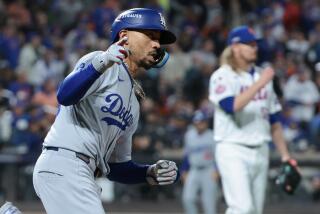Sheffield Has Mets in a Spell
- Share via
Gary Sheffield returned from the hospital just in time.
The lethargic Dodgers needed the boost their cleanup batter provided Friday night, a three-run home run and four runs batted in in an 8-3 victory against the New York Mets before 41,801 at Dodger Stadium.
Sheffield, rushed to the hospital by paramedics after fainting at home early Thursday morning, knows how to play to a crowd and did in his first at-bat after missing Thursday’s loss to the Montreal Expos--homering to left-center on a full-count fastball against Met left-hander Glendon Rusch.
He received a thunderous ovation and stirred a dugout celebration--a rarity for the Dodgers recently--with his 26th homer, and added a run-scoring single in his next at-bat to help stake starter Terry Adams to a 6-0 lead after four innings.
Despite performing a battery of tests at Centinela Hospital Medical Center in Inglewood, physicians have not determined what caused Sheffield to lose consciousness.
But without a medical reason to prevent him from playing, Sheffield rejoined his teammates in a tight playoff race.
“I felt great,” Sheffield said. “I was so excited to get back on the field, I drove everybody crazy at the hospital, especially my wife.
“I got through it, and that’s the most important thing. I feel healthy and I know I’m healthy. I work hard in the off-season to prepare to play every day.
“I was more rested than anybody out there today because I sat in bed for 24 hours. I get more worked up when I have to sit and watch, when I feel like I can help us win. They got tired of me at the hospital.”
Team physician Michael Mellman would have preferred to play it safe, but Sheffield was adamant about playing and he couldn’t find a reason to stop him.
“We did extensive testing of his nervous system, heart and circulatory system, there were some minor variations, but nothing that completely explains what happened,” he said. “We don’t see any problems we were able to define. I’m always happier when I can tell someone what’s happened to them, but it also gives me a great deal of comfort that I didn’t find anything that I have to define as bad news at this point.
“There will be some additional neurological tests that we did not do while he was in the hospital. I’d rather take someone, grind ‘em up, look at ‘em and put them back together all at once. The circumstances allowed us to do what we did. We did four days’ work in one day, and we didn’t see anything that could explain the entire sequence of events that we saw.”
With Sheffield’s timely contribution, the third-place Dodgers (67-55) remained 31/2 games behind the first-place Arizona Diamondbacks in the National League West, getting only their second victory in eight games and sixth in 17.
New leadoff batter Adrian Beltre also provided a spark with three of the club’s 10 hits, two runs and one knocked in.
Struggling Eric Karros and Marquis Grissom also helped.
Karros had a run-scoring double and Grissom hit his 18th homer--a two-run shot in the eighth to extend the lead to 8-3.
Robin Ventura led off the fifth with a single for the Mets’ first hit against Adams (9-5), who then gave up a one-out, two-run homer to Tsuyoshi Shinjo.
Adams pitched six innings in his third consecutive quality start while outpitching Rusch (6-8), who worked only 22/3 innings.
Former Dodger Mike Piazza was hitless in four at-bats, grounding into two double plays.
The Dodgers have a sense of urgency after dropping two of three to the Expos, and they said having Sheffield back in the lineup helps their cause.
“Whatever he does offensively doesn’t surprise me,” Manager Jim Tracy said. “He’s one of the best right-handed hitters in the league. Time after time, he comes through in situations like this.”
Sheffield is tentatively scheduled to undergo neurological tests Monday at Centinela Hospital.
Mellman hopes the next phase of testing reveals the problem.
“What I would rather do is know exactly what happened to him and the reasons for it,” Mellman said. “The one thing I thank God for is that he is not a construction worker, working 30 floors up, and I don’t know what happened to him. We’re talking about issues of life as opposed to issues unique to the game. Gary is a patient that, like any patient, I am concerned [about] because I don’t have an answer at this point.
“If you don’t know the cause then it could happen at any time. There’s no guarantees even when you know the cause. We have some thoughts and we’ll try to sort those out as best we can, but I have no way of guaranteeing this wouldn’t happen again.”
More to Read
Are you a true-blue fan?
Get our Dodgers Dugout newsletter for insights, news and much more.
You may occasionally receive promotional content from the Los Angeles Times.






